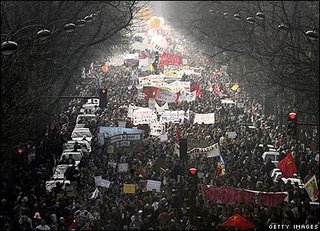
French Protest Job Bill
By Jennifer Barnett
From Political Affairs Magazine
After a weekend of protests in which 1.5 million people took to the streets, French labor unions are preparing for a general strike in response to what they call a dangerous and disturbing new law.
The law would allow employers to fire people under age 26 without cause within two years of being hired. Prime Minister Dominique de Villepin claims it will ease youth unemployment. But student and labor groups say it will aggravate the problem and allow employers to treat young workers like trash.
The youth unemployment rate in France is 23 percent, more than double the general jobless rate. In the poorest areas youth joblessness is as high as 50 percent.
France’s current, long-standing labor law allows employers just a few months to terminate a new employee without giving a reason. After that, the law sets strict standards for firing employees. Opponents of the so-called “first jobs contract” (CPE) have nicknamed it the “Kleenex contract” because of the disposable workforce it would create.
The new law is to be enacted when signed by President Jacques Chirac next month.
Unions have called for a national day of strike actions on March 28 to protest the plan. Bolstered by this support, student groups called for more large-scale protests March 21 and 23.
Public figures joining protests in 150 cities on March 18 included Paris Mayor Bertrand Delanoe, Socialist Party leader François Hollande, former culture minister Jack Lang and Communist Party leader Marie-George Buffet.
The protest in Paris was marred by minor violence, in which a small number of demonstrators set fire to a police car. In response, police fired tear gas into the crowd. By and large the march was peaceful, though, with a festive atmosphere.
Carole Cases, a nurse who participated in the protest with two of her children, told The New York Times, “I’m sick and tired of all these phony contracts and I want to protect my children’s future. They’re trying to dupe the young.”
Many were upset with the quickness with which the measure passed through the Parliament. Bruno Julliard, a leader of the national student group UNEF, said the government “imposed the jobs plan without consulting anyone.” He said the government only agreed to talks after the large demonstrations. UNEF, in turn, has refused to join talks until the contract is withdrawn.
De Villepin was expected to offer an amended version of the contract, possibly requiring a justification for firing or shortening the trial period during which the young worker could be fired. He has said publicly that he will stand by the law and that it will not be withdrawn.
The CGT, France’s largest union federation, said in a March 21 statement, “This measure, ineffective for employment, offers employers a new means of pressuring employees to renounce most of their rights under the penalty that they will be pushed out the door: it is a welcome to unpaid additional hours, worsened work conditions, lower salaries, sick days not respected, scorned dignity, etc.”
According to the federation, 75 percent of the population wants the CPE to be withdrawn. CGT leader Bernard Thibault said, “If this momentum continues, I think we will quickly get the withdrawal.”
In a January statement, the Communist Party of France stated its opposition to the CPE. Instead, the party proposed “a large progressive reformation of the labor code, aiming for job security … and income for all.” The statement also called for businesses to be socially responsible.
In addition to the planned labor strikes, UNEF has led student strikes at a number of universities. Student groups also worry that the CPE would make housing problems worse for young workers. Many landlords won’t rent to young workers because of their precarious financial situation.
“There is a big housing crisis in France. With this contract, no young workers will be able to get an apartment,” said Julie Coudry, president of the Student Confederation.
The new law is seen as part of pro-corporate “structural reforms” called for by international financial institutions. European Central Bank President Jean-Claude Trichet said March 20 it was absolutely necessary for European governments to conduct such “reforms.”

Humiliation for French Government
By Caroline Wyatt
From BBC News
Trade unions and protesters in France are claiming victory after the French government performed a complete U-turn on its controversial youth jobs law.
On Monday, the French government said it would withdraw the law, which would have allowed employers to sack anyone under the age of 26 within the first two years of their employment.
The measure had provoked weeks of protests, until finally, Prime Minister Dominique de Villepin conceded defeat and said he would find other ways of reducing the numbers of young jobless.
This was a humiliating climbdown for Mr de Villepin, who had staked his political reputation on pushing through what initially seemed like a minor reform to a wider law on equal job opportunities for the disadvantaged.
Vociferous anger
The youth jobs law, the CPE, was aimed at helping youngsters in the troubled suburbs find jobs, after anger over high unemployment exploded into rioting last November.
Yet these reforms unleashed almost equally vociferous anger across France, from mainly middle-class students who feared their future job security - and the jobs for life many of their parents had enjoyed - was being fatally undermined by the French government.
Over the past months, the French trade unions called out millions onto the streets in support of the students, with the demonstrations culminating in what the unions claimed were three million people marching in protest last week, though the police put the figure at half that number.
On this issue, the unions found a new voice, ultimately forcing President Jacques Chirac to back down - and Mr de Villepin with him. On Monday, Mr de Villepin did his best to paint this climbdown as the actions of a government and a prime minister listening to the French people.
'Deep anxiety'
"I wanted to act fast on joblessness, because the dramatic situation and the despair of many young people made it vital," he said.
"Initially, I wanted to put forward a strong solution. Not everyone understood that, and I regret it. The dialogue is now open and we should not close it again. This crisis reveals a deep anxiety in France, as much as a desire for modernisation."
Yet student leaders Victor Vidilles and Nabila Ramdani say Mr de Villepin's withdrawal of the law was only a first step, with more student protests planned for Tuesday to keep up the pressure on the French government as it formulates a new proposal this week. "It's not enough because there is still a high unemployment rate in France," said Mr Vidilles.
"We have to be extremely vigilant, and make sure that the government helps everyone - not just students - overcome the serious problem of unemployment here."
Ms Ramdani was more optimistic, though still guarded. "This is the first battle we have won, but not the whole war," she tells me outside Place de la Sorbonne, which is still fenced off by French police guarding the square against further student sit-ins. "We want to know exactly what proposals will be put forward by the government - and now that a real dialogue is possible, to discuss exactly what future the government can offer to young people."
The French prime minister's own future, however, is now in some doubt. Dominique de Villepin had wanted to show that he was a strong leader, who could push through reform in order to be seen as a serious presidential candidate for the right next year.
With this U-turn, almost all hope of that has now disappeared - along with any belief that Mr Chirac might use the final year of his presidency to try to reform the French economy and to liberalise France's labour market, as many on the right in France believe is necessary.
0 Comments:
Post a Comment
<< Home